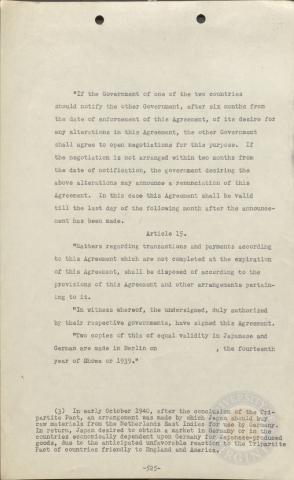
Page 525
| Parent | Collaboration between Japan, Germany and Italy Vol. VI |
|---|---|
| Date | |
| Language | English |
| Collection | Tavenner Papers & IMTFE Official Records |
| Box | Box 15 |
| Folder | Japan, Germany, Italy Collaboration Vol 6 |
| Repository | University of Virginia Law Library |
"If the Government of one of the two countries should notify the other Government, after six months from the date of enforcement of this Agreement, of its desire for any alterations in this Agreement, the other Government shall agree to open negotiations for this purpose. If the negotiation is not arranged within two months from the date of notification, the government desiring the above alterations may announce a renunciation of this Agreement. In this case this Agreement shall be valid till the last day of the following month after the announce¬ment has been made.
Article 15*
"Matters regarding transactions and payments according to this Agreement which are not completed at the expiration of this Agreement, shall be disposed of according to the provisions of this Agreement and other arrangements pertain¬ing to it.
"In witness whereof, the undersigned, duly authorized by their respective governments, have signed this Agreement.
"Two copies of this of equal validity in Japanese and German are made in Berlin on, the fourteenth
year of Showa or 1939•M
(3)In early October 1940, after the conclusion of the Tri-partite Pact, an arrangement was made by which Japan should buy raw materials from the Netherlands East Indies for use by Germany. In return, Japan desired to obtain a market in Germany or in the countries economically dependent upon Germany for Japanese-produced goods, due to the anticipated unfavorable reaction to the Tripartite Pact of countries friendly to England and America.
